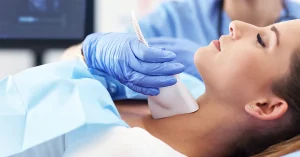Medical Procedures
Thyroid and Parathyroid
- Thyroidectomy + Lymphadenectomy
- Subtotal Parathyroidectomy
Neuroendocrine Tumors
- Pancreatic Neuroendocrine Tumor Removal
Adrenal

Regain your balance and health with the help of a safe and effective procedure. Total thyroidectomy is a modern and precise solution for thyroid disorders that affect your quality of life.
At VenArt Clinic, you benefit from the expertise of a multidisciplinary team and state-of-the-art technology for personalized treatment and rapid recovery.
Book an Appointment
What is a total thyroidectomy?
Total thyroidectomy is a surgical procedure that completely removes the thyroid gland. It is indicated in cases of thyroid cancer, large goiter, or hyperthyroidism that does not respond to treatment. The operation is performed under general anesthesia, and the patient remains hospitalized for about one day.
After the operation, because the body no longer produces thyroid hormones, hormone replacement therapy with levothyroxine, administered daily, is necessary to maintain normal metabolism.
At the VenArt Clinic, patients are evaluated by a multidisciplinary medical team, and procedures are performed using modern technology in a safe environment, with careful postoperative monitoring for fast recovery and optimal hormonal balance.
When is total thyroidectomy necessary?
Thyroidectomy is indicated when the thyroid gland undergoes changes that affect the patient’s health or quality of life. It is recommended in cases of suspected malignant nodules or confirmed thyroid cancer, as well as in the presence of a goiter or large nodules that compress the trachea or esophagus, causing difficulty breathing or swallowing.
It is also an option in hyperthyroidism that does not respond to conservative treatments.
How is a total thyroidectomy performed?
Total thyroidectomy requires careful, step-by-step preparation, including detailed medical evaluations and compliance with preoperative instructions. At the VenArt Clinic, the protocol is customized for each patient through collaboration between the surgeon, endocrinologist, and anesthesiologist to ensure the safety and success of the procedure.
Preoperative steps include:
- Initial consultation with the surgeon and endocrinologist;
- Imaging investigations such as thyroid ultrasound or computed tomography (CT) to accurately locate the lesion;
- Fine needle aspiration biopsy (FNAB) in the case of nodules to determine whether they are benign or malignant;
- Evaluation of vocal cord function, especially if there are symptoms of dysphonia;
- Adjustment of hormone treatment (especially in cases of hyperthyroidism);
- Temporary discontinuation of certain medications, such as anticoagulants – only as directed by your doctor;
- Stopping smoking before the procedure to reduce the risk of complications.
On the day before the intervention
- Pre-anesthesia consultation, where the patient informs the doctor about chronic conditions, ongoing treatments, and allergies;
- Signing the informed consent form after discussing the details of the procedure;
- Fasting (liquids and solids) for at least 6 hours before the procedure;
- Administration of preoperative treatment (antibiotic, anticoagulant, etc.), as recommended.
On the day of the intervention
- General anesthesia is administered (via mask or intravenously);
- A tracheal tube is inserted to ensure breathing;
- Constant monitoring of vital signs: heart rate, blood pressure, oxygenation.
Schedule a consultation now!
At the VenArt Clinic, patients are evaluated by a multidisciplinary team, and procedures are performed using modern technology in a safe environment, with careful post-operative monitoring for fast recovery and optimal hormonal balance.
Medical Team
Frequently Asked Questions
What to expect after thyroidectomy?
After surgery, you will need daily hormone treatment (levothyroxine) and will be monitored for hormone balance. Recovery is usually quick.
Are there any complications after surgery?
Yes, but they are rare. They may include bleeding, infection, damage to the vocal nerves, or low blood calcium (hypocalcemia).
Does thyroidectomy affect the voice?
It can temporarily affect the voice due to irritation or damage to the laryngeal nerves, but in most cases the voice returns to normal.
How is a thyroidectomy performed?
Thyroidectomy is a procedure that involves the partial or total removal of the thyroid gland. It is performed under general anesthesia and involves a small incision in the neck. Recovery is quick, and scars are usually very discreet.

